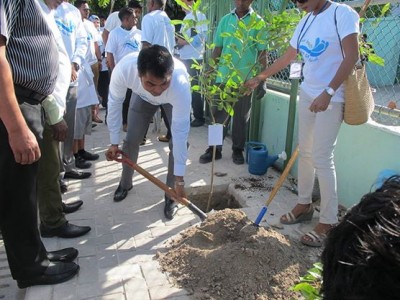Criminal records of more than 2,000 youth have been cleared or expunged since the current administration took office in November, Home Minister Umar Naseer told parliament last week.
Appearing for minister’s question time at Wednesday’s sitting of parliament, Naseer explained that criminal records are cleared for suspects involved in cases that are not forwarded for prosecution following investigation by police.
Criminal records would not be cleared for suspects whose cases are sent to the Prosecutor General’s (PG) Office, he added.
“So we are following that rule now and the number of youth with criminal records will be fewer than before now,” he said.
However, Naseer stressed that the Home Ministry could not expunge all criminal records as “this involves employers’ rights as well”.
Employers needed to “know who they are giving a job to,” Naseer said.
The home minister was responding to a question from Progressive Party of Maldives (PPM) MP for Addu Feydhoo, Ibrahim Didi, who said he received a lot of calls from young people in his constituency who were unable to get jobs due to criminal records.
Most of the youth had criminal records for minor offences, he said.
In January, police revealed that records of 1,023 persons arrested for various offences were cleared under an initiative to provide job opportunities to youth.
A 2012 report on gang culture in the Maldives noted that lack of employment opportunities was one of the main reasons young people join criminal gangs.
Criminal records even for minor offences are not cleared for five years, the report noted.
“Sustained effort”
Meanwhile, in April, President Abdulla Yameen granted clemency to 169 convicts serving jail sentences or under house arrest or banishment following an announcement at a campaign rally in Fuvahmulah.
Naseer told Minivan News in the wake of President Yameen’s announcement that the release of inmates would not present any difficulties to ongoing efforts to combat drug trafficking.
“It will not be a hindrance because the present Clemency Act prevents serious offenders from being released. Furthermore, this process will be monitored by the Home Ministry,” he said.
President Yameen also commuted the sentences of 24 inmates in January while his predecessor Dr Mohamed Waheed released 39 convicts during his last days in office.
The “main difficulty” at present for law enforcement was the delay in concluding cases through the criminal justice system, Naseer told MPs.
While the role of police was over after sending a case for prosecution, Naseer said cases were often delayed either at the PG’s Office or at court.
Asked about efforts to combat drug trafficking, Naseer said he estimated a period of 15 years would be needed with a “sustained effort” by successive administrations to address the country’s drug problem.
The police Drug Enforcement Department (DED) has conducted more operations in the past six months than was previously conducted in one year, Naseer claimed.
More drugs were also seized in the past six months than previous years, he added.
Discussions have taken place “at the technical committee level” with airport operators and customs officials to “seal” all points of entry, Naseer said.
In an interview with Minivan News in January, Naseer said that the main target of his ministry for the next five years would be curbing drug-related crimes.
